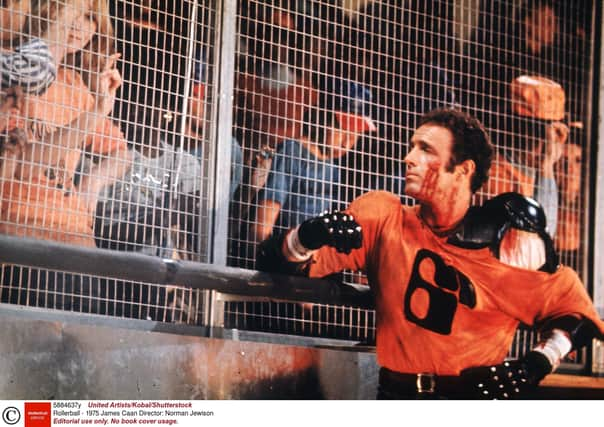Aidan Smith: Could money drive football back to action in a ‘Rollerball’ scenario?


Any time sport – and more often than not it’s football – goes a bit crazy on the pitch or a bit corporately sinister in the boardroom, some wag will mention Rollerball.
The film – avoid the 2002 remake, it’s terrible – was a dystopian satire of dark foreboding. It painted a picture of what might result if the desire to win was pushed to the nth degree. If the supporters’ lust for competitiveness became insatiable. If it all just became about the money.
Advertisement
Hide AdAdvertisement
Hide AdNow, I’m not suggesting that the plan to resume England’s Premier League next month behind closed doors is the work of deranged and dangerous minds. Presumably it hasn’t a hope in hell of happening if there is even the remotest risk to the health of the players and the small number of people who will be allowed inside the stadia. But, still, isn’t there the whiff of Rollerball about it?
Money is the main driver. If the league is not finished by 16 July then as much as £762 million might have to be paid back to TV companies. Broadcasters such as Sky and BT Sport have a watertight deal which allows them to claim rebates if the competition doesn’t complete.
Then there is the issue of what kind of matches the armchair audience would watch. British TV audiences have seen behind-closed-doors matches only sporadically, usually when foreign opponents have been hit with a ban on fans for previous misdemeanours such as racist chanting. Inevitably these affairs are weird with shouts from the technical areas echoing round empty grounds accentuating the eeriness.
But another reason some would make the Rollerball comparison is the danger factor. Admittedly players would not be chasing a metal sphere fired like a pinball round a velodrome-type arena, dodging speeding motorbikes and the iron fist of Caan’s character in the movie, Jonathan E. Still, how would they feel returning to football when there hasn’t been a single prediction that Covid-19 will be gone in two months – when indeed there have been warnings the country could remain in some element of lockdown for six months?
How do you tackle and maintain social distancing? Obviously you can’t. A report yesterday claimed the government is keen for football to resume in some form, provided it would not be a public risk or a drain on resources. But does every player have to undergo testing for the virus before he kicks a ball again? Surely that precaution should be taken. But would that not cause resentment of the kind that has erupted over politicians being checked while the rest of the population must wait in line? Some players may be reluctant to return because the profession is not insured against coronavirus. Indeed, there might be one or two who would prefer to take their chances getting in a car with Jack Grealish, the Aston Villa poster boy and Covid-19 bad boy.
Many fans admit they are struggling to maintain perspective during the pandemic and will come right out and say it: they’re missing football dreadfully. To those who argue it is only football and there are far bigger concerns right now, supporters could turn to a line from Rollerball, even if it is uttered by one of the sinister corporates: “You know how the game serves us – it has a definite social purpose.”
The broadcasters are missing football drastically as subscribers endure the on-hold muzak to cancel their deals. But if the rest of 2019-20 is played out with no fans and zero atmosphere, would they be prepared to offer rebates of their own?
Scottish football, unsure of what to do next, will await with interest the outcome of Friday’s conference call involving England’s 20 top-flight clubs.
Advertisement
Hide AdAdvertisement
Hide AdWhile the plan would still need the backing of the government, public health bodies and the PFA, runaway leaders Liverpool must surely be hoping it becomes a reality after recent rumblings from Uefa about leagues possibly not finishing anywhere. Andy Robertson’s team, justly proud of Anfield’s passion, would not want to be winning the club’s first title in 30 years in such ghostly surroundings. But better that than no title at all.
One last thing: should “the Prem” make this kind of comeback it may be beneficial to the superstars of the self-styled best league in the world – accustomed to “sold out” signs every week – to mentally prepare themselves for a different experience.
They could speak to the doughty men of St Johnstone and Kilmarnock whose modest crowds often mean that goals are scored against backdrops of virtually empty seats.
Better that, though, than no football whatsoever.
A message from the Editor:
Thank you for reading this story on our website. While I have your attention, I also have an important request to make of you.
With the coronavirus lockdown having a major impact on many of our advertisers - and consequently the revenue we receive - we are more reliant than ever on you taking out a digital subscription.
Subscribe to scotsman.com and enjoy unlimited access to Scottish news and information online and on our app. With a digital subscription, you can read more than 5 articles, see fewer ads, enjoy faster load times, and get access to exclusive newsletters and content. Visit https://www.scotsman.com/subscriptions now to sign up.
Our journalism costs money and we rely on advertising, print and digital revenues to help to support them. By supporting us, we are able to support you in providing trusted, fact-checked content for this website.
Frank O’Donnell
Editorial Director
Comments
Want to join the conversation? Please or to comment on this article.
